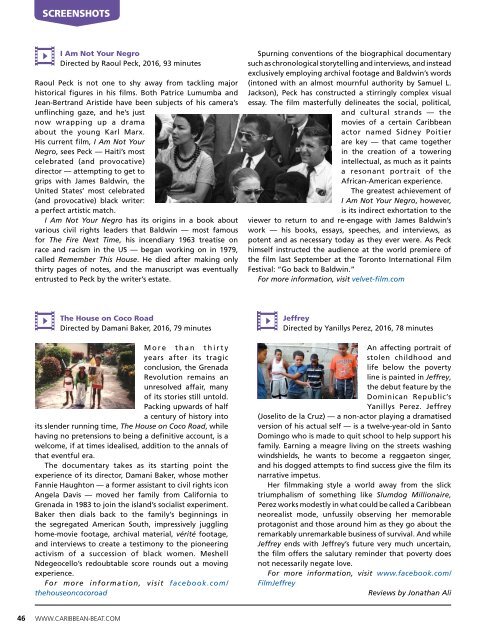Caribbean Beat — January/February 2017 (#143)
A calendar of events; music, film, and book reviews; travel features; people profiles, and much more.
A calendar of events; music, film, and book reviews; travel features; people profiles, and much more.
You also want an ePaper? Increase the reach of your titles
YUMPU automatically turns print PDFs into web optimized ePapers that Google loves.
SCREENSHOTS<br />
I Am Not Your Negro<br />
Directed by Raoul Peck, 2016, 93 minutes<br />
Raoul Peck is not one to shy away from tackling major<br />
historical figures in his films. Both Patrice Lumumba and<br />
Jean-Bertrand Aristide have been subjects of his camera’s<br />
unflinching gaze, and he’s just<br />
now wrapping up a drama<br />
about the young Karl Marx.<br />
His current film, I Am Not Your<br />
Negro, sees Peck <strong>—</strong> Haiti’s most<br />
celebrated (and provocative)<br />
director <strong>—</strong> attempting to get to<br />
grips with James Baldwin, the<br />
United States’ most celebrated<br />
(and provocative) black writer:<br />
a perfect artistic match.<br />
I Am Not Your Negro has its origins in a book about<br />
various civil rights leaders that Baldwin <strong>—</strong> most famous<br />
for The Fire Next Time, his incendiary 1963 treatise on<br />
race and racism in the US <strong>—</strong> began working on in 1979,<br />
called Remember This House. He died after making only<br />
thirty pages of notes, and the manuscript was eventually<br />
entrusted to Peck by the writer’s estate.<br />
Spurning conventions of the biographical documentary<br />
such as chronological storytelling and interviews, and instead<br />
exclusively employing archival footage and Baldwin’s words<br />
(intoned with an almost mournful authority by Samuel L.<br />
Jackson), Peck has constructed a stirringly complex visual<br />
essay. The film masterfully delineates the social, political,<br />
and cultural strands <strong>—</strong> the<br />
movies of a certain <strong>Caribbean</strong><br />
actor named Sidney Poitier<br />
are key <strong>—</strong> that came together<br />
in the creation of a towering<br />
intellectual, as much as it paints<br />
a resonant portrait of the<br />
African-American experience.<br />
The greatest achievement of<br />
I Am Not Your Negro, however,<br />
is its indirect exhortation to the<br />
viewer to return to and re-engage with James Baldwin’s<br />
work <strong>—</strong> his books, essays, speeches, and interviews, as<br />
potent and as necessary today as they ever were. As Peck<br />
himself instructed the audience at the world premiere of<br />
the film last September at the Toronto International Film<br />
Festival: “Go back to Baldwin.”<br />
For more information, visit velvet-film.com<br />
The House on Coco Road<br />
Directed by Damani Baker, 2016, 79 minutes<br />
More than thirty<br />
years after its tragic<br />
conclusion, the Grenada<br />
Revolution remains an<br />
unresolved affair, many<br />
of its stories still untold.<br />
Packing upwards of half<br />
a century of history into<br />
its slender running time, The House on Coco Road, while<br />
having no pretensions to being a definitive account, is a<br />
welcome, if at times idealised, addition to the annals of<br />
that eventful era.<br />
The documentary takes as its starting point the<br />
experience of its director, Damani Baker, whose mother<br />
Fannie Haughton <strong>—</strong> a former assistant to civil rights icon<br />
Angela Davis <strong>—</strong> moved her family from California to<br />
Grenada in 1983 to join the island’s socialist experiment.<br />
Baker then dials back to the family’s beginnings in<br />
the segregated American South, impressively juggling<br />
home-movie footage, archival material, vérité footage,<br />
and interviews to create a testimony to the pioneering<br />
activism of a succession of black women. Meshell<br />
Ndegeocello’s redoubtable score rounds out a moving<br />
experience.<br />
For more information, visit facebook.com/<br />
thehouseoncocoroad<br />
Jeffrey<br />
Directed by Yanillys Perez, 2016, 78 minutes<br />
An affecting portrait of<br />
stolen childhood and<br />
life below the poverty<br />
line is painted in Jeffrey,<br />
the debut feature by the<br />
Dominican Republic’s<br />
Yanillys Perez. Jeffrey<br />
(Joselito de la Cruz) <strong>—</strong> a non-actor playing a dramatised<br />
version of his actual self <strong>—</strong> is a twelve-year-old in Santo<br />
Domingo who is made to quit school to help support his<br />
family. Earning a meagre living on the streets washing<br />
windshields, he wants to become a reggaeton singer,<br />
and his dogged attempts to find success give the film its<br />
narrative impetus.<br />
Her filmmaking style a world away from the slick<br />
triumphalism of something like Slumdog Millionaire,<br />
Perez works modestly in what could be called a <strong>Caribbean</strong><br />
neorealist mode, unfussily observing her memorable<br />
protagonist and those around him as they go about the<br />
remarkably unremarkable business of survival. And while<br />
Jeffrey ends with Jeffrey’s future very much uncertain,<br />
the film offers the salutary reminder that poverty does<br />
not necessarily negate love.<br />
For more information, visit www.facebook.com/<br />
FilmJeffrey<br />
Reviews by Jonathan Ali<br />
46 WWW.CARIBBEAN-BEAT.COM


















